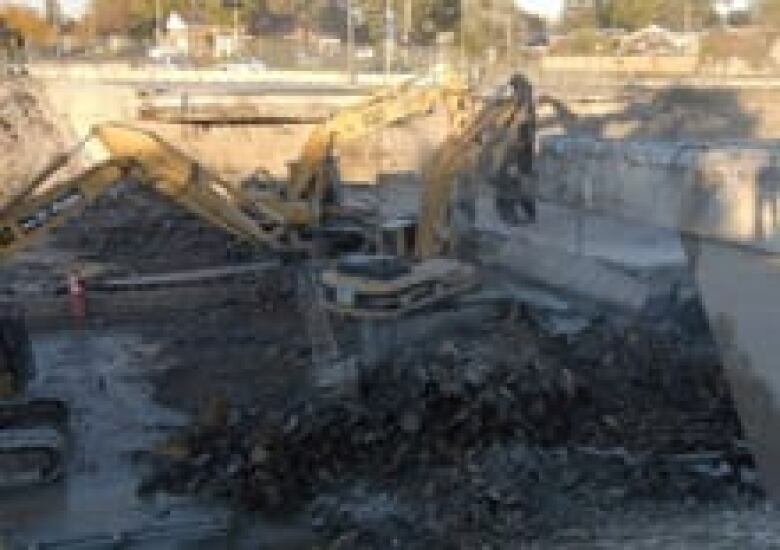Blame debated at Concorde overpass hearings
Quebec's no-fault policy likely to block lawsuits: lawyer
The commission investigating the deadly Concorde overpass collapse last fall entered its final stage on Tuesday as lawyers representing various partiesdebated blamefor the disaster.
The collapse, which killed five people and injured six, is ultimately Transport Quebec's responsibility, argued Patrick Henry, a lawyer representing Desjardins-Sauriol, the company hired to build the overpass just north of Montreal.
In his closing arguments presented Tuesday morning at the commissions hearings in Montreal, Henry admitted his client made a major error when workers installed steel rebars designed to reinforce the overpass.
But Transport Quebec engineers missed several opportunities to notice the mistake and take steps to prevent the eventual collapse of the Laval overpass, he told the commission, which is headed by former Quebec premier Pierre Marc Johnson.
Too much time has passed for his clients to be blamed, Henry said.
"The passage of time has done two things: First of all, you rely on the memory of older people, who may or may not remember all the facts of the events that took place at the time.
"Secondly, [there is] the absence of very important documentation which should have been analyzed by this commission, which unfortunately was not available because it was destroyed, or did not exist anymore."
The province's Transport Department rebutted Tuesday afternoon, with lawyers arguing that construction errors ultimately led to the overpass collapse.
"Evidence that we could have observed [during inspections] were not sufficient to require further investigations," said Jacques Gagnon, a regional director with Transport Quebec.
The commission has heard evidence that the province's Transport Department delayed repairs to the overpass and ignored recommendations to reinforce the structure because of budget constraints and lack of manpower in 1995.
The inquirywill determine what causes contributed to the collapse on Sept. 30, 2006, and is expected to submit its report by October this year.
Quebec no-faultruleslimit victim compensation
Victims of the collapseare only beginning their fight for compensation in the months following the catastrophe, but a lawyer says the province's no-fault insurance system will virtually ensure none of their lawsuits will go through.

Mohammed Ashraff was driving on the Concorde overpass before its fatal collapse. His delivery van plunged off the overpass onto the highway below, followed by tonnes of metal and concrete slabs that rained down on him, breaking his back.
Although Ashraff was one of the survivors, the Montrealer now walks with a cane, is in intensive physiotherapy and is unable to work.
He wants compensation, but lawyer and former provincial justice minister Marc Bellemare said Quebec's no-fault insurance policy will likely prevent that.
"Any kind of injury resulting from using a car is considered a car accident in Quebec, and that's the problem," Bellemare said.
Bellemare and overpass victims have argued that the Laval accident should be considered on its own, not as an ordinary car accident but as a bridge accident.
Paul Cousineau and his wife were wedged under concrete and trapped in their car for hours that day and suffered back injuries.
They said the situation proves there is a major gap in the province's auto insurance system.
All the victims will likely receive about $50,000from the provincial insurance board, but theysay their losses are worth much more.
Hundreds of bridges, overpasses being re-examined
The commission's work this past spring prompted the Quebec government to announce it would inspect and repair 135 bridges that share a similar design to the Highway 19 Concorde overpass.
The province also banned heavy trailer-trucks from listed bridges and overpasses until inspections are completed.
The City of Montreal has since inspected more than 200 highway structures under its jurisdiction, and on Tuesday flagged nine that it said are risky and need repairs.












_(720p).jpg)


 OFFICIAL HD MUSIC VIDEO.jpg)
.jpg)



























































































